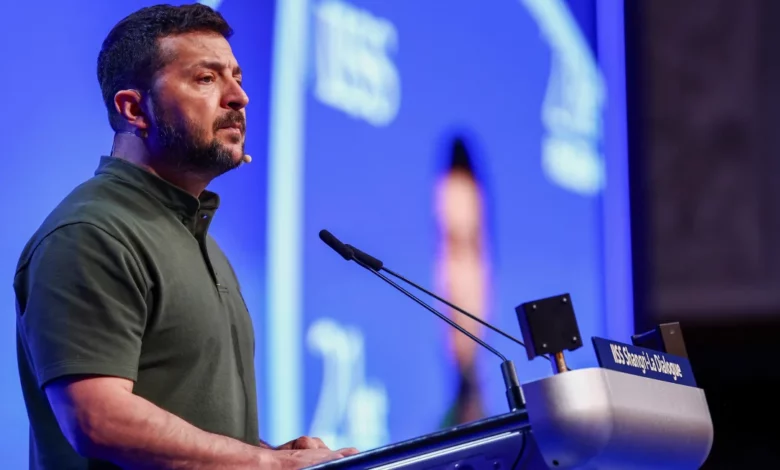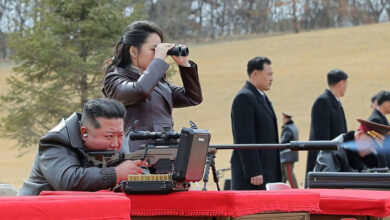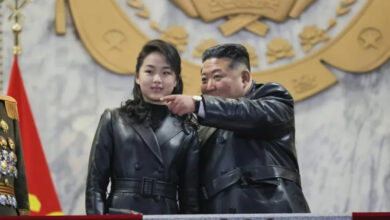
Russia is pressuring countries to skip an upcoming peace summit on Ukraine, President Volodymyr Zelensky said Sunday during an appearance at a meeting of defense chiefs from across the Asia-Pacific, including China and the US.
Zelensky used the previously unannounced appearance as an opportunity to rally more countries in the region to commit to participate in the conference, slated to be held June 15-16 in Switzerland.
“Time is running out” including for Ukrainian children taken by Russia, Zelensky told a packed hall during an address on the closing day of the three-day security meeting, and the gathering in Switzerland would enable countries to come to a consensus on peace in Ukraine that could be “passed to Russia.”
So far more than 100 countries and international organizations have committed to join the gathering, Zelensky said in his speech. China, which remains Moscow’s most powerful backer, last week said it would not send a delegation to the conference.
The Ukrainian leader’s in-person appeal at the Shangri-la Dialogue comes as Ukraine’s troops scramble to repel a major Russian advance into its northeast region of Kharkiv amid shortages of weaponry and manpower more than two years into Russia’s invasion – raising the urgency for Kyiv to bolster international support for its peace plan.
Zelensky’s plan calls for the full withdrawal of Russian forces and a restoration of Ukraine’s internationally recognized borders. The Ukrainian leader has previously said he won’t negotiate with Russia until its forces withdraw.
“Now Russia is trying to disrupt the peace summit and that is true … (Russia) is now traveling around many countries in the world threatening them with the blockade of the agricultural goods, of the food products, of chemical products … it is simply pushing the other countries of the world so that they’re not present on the summit,” Zelensky said, speaking through a translator during a question-and-answer session following his speech.
Zelensky underscored that Ukraine was “ready to hear various proposals and thoughts” on ending the conflict during the gathering in Switzerland.
The summit, he said, would address three points of his peace formula, including “nuclear security, food security, and the release of prisoners of war,” as well as “Ukrainian children abducted by Russia.”
The International Criminal Court in The Hague last year issued an arrest warrant for Russian President Vladimir Putin for an alleged scheme to deport Ukrainian children to Russia.
The Ukrainian leader also called for more international pressure on Russia, which has already been heavily sanctioned by countries across the world.
“The world has to be resilient, has to be strong, has to put pressure on Russia. There is no other way to stop Putin – only diplomatic isolation, strong Ukrainian military and for all the countries of the world to not balance between Ukraine and Russia but defend international justice and law,” he said.
Russia has referred to the conference as “trickery” designed by the United States, with a Ministry of Foreign Affairs spokesperson last week saying the “real ‘peace formula’” was for Western countries to stop providing Ukraine with weaponry.
Shangri-la Dialogue sideline diplomacy
The upcoming peace summit and Ukraine’s defense were also key topics for Zelensky as he held sideline meetings since arriving in Singapore on Saturday.
Those included talks with US Defense Secretary Lloyd Austin, Indonesia’s President-Elect Prabowo Subianto, and Timor-Leste’s President José Ramos-Horta, as well as a delegation of American lawmakers.
In his meeting with Zelensky Sunday morning, Austin reiterated “unwavering US support for Ukraine in the face of Russian aggression” and provided an update on American security assistance to Ukraine, according to a readout from Pentagon Press Secretary Maj. Gen. Pat Ryder after the meeting.
Zelensky said in a post on Twitter that the two sides discussed “the defense needs of our country, bolstering Ukraine’s air defense system, the F-16 coalition, and drafting of a bilateral security agreement.” He also thanked US President Joe Biden for “an important decision” regarding defensive strikes with American weapons, in reference to the White House’s decision, as reported by CNN, to permit Ukraine to use American munitions for limited strikes within Russian territory.
During his address, Zelensky also noted Ukraine’s disappointment that some world leaders had not confirmed their participation in the summit.
China on Friday announced that it would not send a delegation to the conference, with its foreign ministry citing its view that any international peace conference should have “recognition by both Russia and Ukraine, equal participation by all parties, and fair discussion of all peace plans.”
Chinese Minister of National Defense Dong Jun in an address earlier Sunday said China had been “promoting peace talks with a responsible attitude.”
Dong also appeared to respond to US allegations that China is bolstering Russia’s defense industrial base with dual-use exports, saying in his remarks that China has not provided weapons to either side in the conflict and had put “stricter control” on dual-use exports.
US defense chief Austin raised those transactions with Dong during a sideline meeting Friday, where he warned of consequences for any Chinese support of Russia’s military.
Countries in the region have watched warily as Moscow and Beijing have deepened their strategic partnership during Russia’s war. North Korea’s provision of munitions to Russia in recent months, as reported by the US and its allies, has also raised concerns.
Meanwhile, the ramifications of Russia’s war in Ukraine have been felt in other ways across the region, where several nations – including Shangri-la Dialogue host country Singapore – have leveraged sanctions against Russia, while key US allies in the Asia-Pacific have enhanced their cooperation with NATO.
CNN’s Natasha Bertrand and Eric Cheung contributed to this report.




